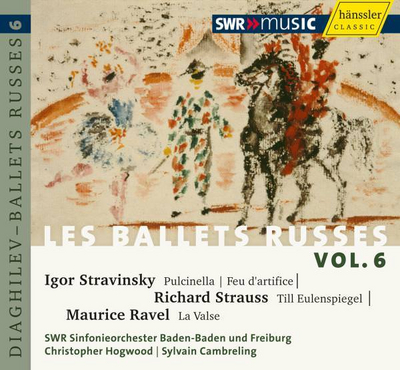Diaghilev, Sergei: Les Ballets Russes Vol. 6

1985. 2005, 2007
2010
Igor Strawinsky
Maurice Ravel
Richard Strauss
Arleen Augér
Robert Gambill
SWR Sinfonieorchester Baden-Baden und Freiburg
Christopher Hogwood
Sylvain Cambreling
Tr. 1 Igor Strawinsky: Pulcinella (Ballet with three solo voices after G. B. Pergolesi, 1919/1920)
Tr. 19 Igor Strawinsky: Feu d'artifice op. 4 (Feuerwerk)
Tr. 20 Richard Strauss: Till Eulenspiegels lustige Streiche op. 28
Tr. 21 Maurice Ravel: La Valse for Piano (Poème choréographique)
In 1917 Diaghilev’s Ballet had a great success with a tableau by Goldoni: The Good Humored Ladies, with music by Domenico Scarlatti arranged by the contemporary Italian composer Vincenzo Tommsini. Diaghilev now requested a similar work from Stravinsky. Selecting the music of G.B. Pergolesi for his inspiration, Stravinsky constructed his score from fragments and scraps of unfinished works to compose a ballet with a unified course of action and various scenes. The resulting score was Pulcinella, and was inspired by a collection of stories documenting the amorous adventures of this character from the commedia dell'arte.
Stravinsky’s youthful, orchestral showpiece, 'Feu d'artifice' was composed as a wedding present for Nikolai Rimsky-Korsakov's daughter. However, a connection with Diaghilev still exists: the impresario was in the audience when the piece was performed in St. Petersburg in 1909, prompting him to commission the composer for a new work that would become “The Firebird.” In 1917, Diaghilev drew on another pre-existing piece for his production of Strauss’ “Til Eulenspiegel” – which would become the last piece Nijinsky would perform with the Ballet russes. Ravel's 'La Valse' – originally conceived as the tone poem “Wien” - was commissioned by Diaghilev, but was later rejected – a decision that resulted in a permanent break with the composer.